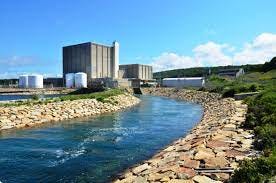EPA rejects Holtec Pilgrim Plant wastewater discharging plan, see why they disagreed
EPA letters refutes Holtec's claim it may discharge treated water under its current permit
David R. Smith Wicked Local
PLYMOUTH - The company overseeing the decommissioning of the Pilgrim Nuclear Power Station in Plymouth has landed in a bit of hot water with the Environmental Protection Agency.
The EPA rejected what it described as Holtec Decommissioning International’s (HDI) “novel interpretation” of its current permits regarding what sort of wastewater can and cannot be discharged into Cape Cod Bay from the inactive spent fuel pool and other sources at the Manomet plant, which closed in 2019.
A look back:Entergy to close Pilgrim Plant by 2019
Holtec wrote to the agency in May stating it believed its current NDPES (National Pollutant Discharge Elimination System) permit allowed them to discharge the million gallons of wastewater remaining at the plant if it were treated.
In a June 17 response to HDI President Kelly Trice, EPA Region 1 Water Division Director Ken Moraff refuted that claim.
“In your letter, you state for the first time that you now believe that the discharge of ‘treated’ wastewater from the spent fuel pool ‘complies with’ the current NPDES permit and assert that this interpretation is ‘well within the plain language of the NPDES permit and would be consistent with the MOU [memorandum of understanding] and past discharge practices,’” Moraff wrote.

Unresolved issue:No decision reached on wastewater disposal at shuttered Pilgrim Nuclear Power Station
Aside from disputing the interpretation, Moraff’s letter said the company had yet to offer a complete and satisfactory account of what any treated water might still contain.
Public outcry
The eventual fate of the million gallons of wastewater, as well as the potential impacts any decision would have on the local ecosystem and economy, has led to numerous protests, discussions and even a congressional field hearing on the issue held in Plymouth by Sen. Ed Markey, D-Massachusetts, that also included U.S. Rep. Bill Delahunt, D-Bourne, back in May. Twin legislation in the State House and Senate also seeks to ban radioactive discharge into the state's waterways.
More:Sen. Markey's congressional hearing on nuclear decommissioning in Plymouth gets commitment
Legislative efforts:Bills to ban water discharge at Pilgrim Station advance, BOH passes resolution in support

The impetus for the outcry was Holtec’s announcement this past November that it would seek to discharge the million gallons in batches over time after it was treated.
In response, the company pledged not to seek any discharges for the remainder of the year, and Holtec CEO Kris Singh pledged at the field hearing to submit water samples to an independent third-party lab (the Woods Hole Oceanographic Institute) and seek consensus among stakeholders and agencies that it was clean enough to release.
Reacting to opposition:Holtec commits to not discharging Pilgrim plant water until third-party testing gives OK
Even if a fully good-faith move by Holtec, the EPA maintains it still has no right to do so under its current permit, no matter how sparkling clear the samples may be.
A new option
The options to date have include discharging, evaporating or transporting the water to an out-of-state storage site, or some combination thereof, although the last of those seems to be off the table, at least on Holtec's end.
"We have pointed out that the suggestion made in the hearing to ship the water to another location for discharge runs counter to the basic tenets of environmental justice, which has led us to discard the idea," Holtec International CEO and President Kris Singh wrote in a June 6 letter to Markey a month after the hearing.
He estimated transporting the water off site could cost upward of $20 million and would entail 250 4,000-mile roundtrip truck trips using 125,000 gallons of diesel fuel.
Given that, and in response to the community's concerns about the remaining options, Singh added another alternative.
"We have also agreed to hold the water inside the plant as long as necessary, even if it means delaying the completion of the decommissioning program (which is likely)," Singh wrote.
The current decommissioning schedule runs from 2019-2027.
Despite Singh's signaling that shipping was off the table, Holtec spokesperson Patrick O'Brien said all the options are still being considered, as no decision has been made so far, although one is expected in the next two to three months.
While he provide a copy of the letter to the EPA, he said the company did not have any comment on the content of the agency's response.
The EPA stated that it was not necessarily out of the realm of possibility of allowing treated water to be discharged at some point under an as-yet-unknow set of conditions if the company could prove the quality as part of an application for a new permit.
“EPA has not prejudged the outcome of any permit modification proceeding. Rather, if presented with a modification request and an appropriate characterization of the proposed discharges, EPA would analyze the submission in accordance with applicable Clean Water Act requirements, including those discharges must meet technology-based effluent limits or any more stringent limits necessary to meet state water quality standards,” the letter stated.
The agency said Holtec has yet to provide any sufficiently detailed data to that end, although the letter said the company had provided some limited sampling at a virtual meeting held May 18.
“(T)his information is not sufficient for EPA to make any regulatory decisions,” Moraff wrote. “The EPA (and the public) has not had an opportunity to examine the pollutants and pollutant concentrations present in this water. Thus, neither you nor EPA can say with any degree of certainty at this time what treatment may be required or at what cost.”
The letter also said neither Entergy nor Holtec provided the agency with information how and when it intended to dispose of the water, leaving it without any framework in which to make any decisions on the specifics of any such requests.
“The EPA could not evaluate at that time the potential impacts of such discharges and, consequently, could not develop appropriate permit limits and conditions,” the letter said.
The letter also noted that while Holtec had appealed several provisions of its NPDES permit to EPA’s Environmental Appeals Board in March 2020, those appeals did not include the provision at play.
“The opportunity for challenging Part I.B.2 has long passed, and EPA stands by, and reiterates, its interpretation in the permit record.“ Moraff wrote.

No comments:
Post a Comment
Note: Only a member of this blog may post a comment.